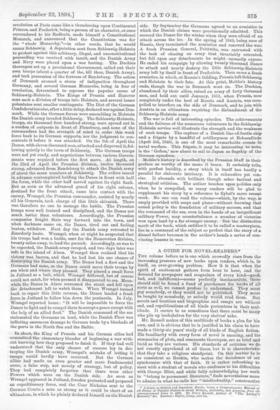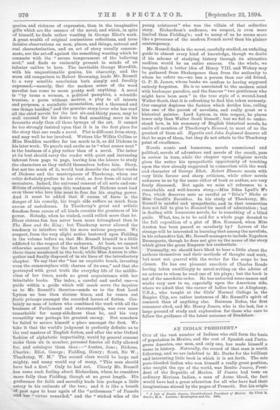A GUIDE FOR NOVEL-READERS.* THE volume before us is one
which avowedly rises from the increasing pressure of new books upon readers, which is, in itself, an ever-growing problem. How it is that when the spirit of excitement gathers from hour to hour, and the demand for newpapers and magazines of every kind—good, bad, and indifferent—seems perfectly inexhaustible, there should still be found a fund of purchasers for books of all sorts as well, we cannot profess to understand. They must pay somebody, or they would not be published. They must be bought by somebody, or nobody would read them. But novels and treatises and biographies and essays are without end, and republications of all kinds portentous in their mul- titude. It occurs to its sometimes that there must he many who pile up bookshelves for the very shelves' sake.
Mr. Russell makes of this multitude of books a. plea for his own, and it is obvious that he is justified in his claim to have made a thirty.six years' study of all kinds of English fiction. His familiarity with every form of novel is amazing, and his summaries of plots, and comments thereupon, are as brief and lucid as they are various. His standards of criticism we do not exactly apprehend at all times, but it is characteristic that they take a religious standpoint. On this matter he is as consistent as Ruskin, who makes the decadence of art synchronise with that of faith. It is rather refreshing to meet with a student of novels who confesses to his difficulties. with George Eliot, and while fully acknowledging her work to "belong to permanent literature," finds nevertheless more to admire in what he calls her "intellectuality," constructive * A Guide to British and American Novels: being a Comprehensive Manual of all Forme of Popular Fiction in Great Britain, Australia, and America, from its commencement down to 1899. By Percy Russell, Author of " The Author's Manual," &o. Loudon r Digby, Long, and Co. genius, and richness of expression, than in the imaginative gifts which are the essence of the novel, and which, in spite of himself, he finds rather wanting in George Eliot's work. A great wealth of original sententious reflections, and terse incisive observations on men, places, and things, natural and real characterisation, and an art of story usually consum- mate, are the set-off against the something wanting which he connects with the " serene temperament of the believing soul," and finds so eminently present in minds of an inferior calibre to hers. The inevitable George Meredith, with his unquestionable genius, his obscurity, and the worn old comparison to Robert Browning, leads Mr. Russell to a very sensible conclusion both simply and forcibly expressed,—namely, that the modern sense of the word novelist has come to mean pretty well anything. A novel is "by turns a sermon, a political pamphlet, a scientific treatise, a poem without metres, a play to all intents and purposes, a socialistic enunciation, and a thousand and one things besides," and the genuine story-lover who has read all the chief novels for the last six-and-thirty years, may be well excused for his desire to find something more in his favourite study than all these byways of the art. It cannot be too strongly insisted upon that it is in the first place for the story that one reads a novel. Plot is different from story, and may well be too involved. Writers like Wilkie Collins or Miss Braddon sacrifice far too much to it, as did Dickens in his later work. To puzzle and excite as to " what comes next " is the business of a play rather than of a novel. The latter at its best should carry the reader with quiet and increasing interest from page to page, leaving him the leisure to study the characters as they unfold themselves before him. Story, but not too much of it, would best describe the earlier works of Dickens and the masterpieces of Thackeray, whom our critic definitely prefers to his rival, as free from all taint of caricature. Indeed, the universal consent of all sorts and con- ditions of criticism upon this weakness of Dickens must lead even those who love him most to fear for his staying power. And it must be added that if excess of farce is the danger of his comedy, his tragic side suffers as much from excess of melodrama. In Thackeray's great and artistic freedom from excess of all kinds consists the greatness of his power. Nobody, when he wished, could rollick more than he. Sheer riotous fun has never been more triumphant than in The Bose and the Ring ; but Thackeray never allowed the tendency to interfere with his more serious purposes. We suspect, from the very slight notice bestowed upon Fielding in the volume before us, that Mr. Russell himself is a little addicted to the respect of the unknown. At least, we cannot otherwise account for the fact that Fielding's name is but three times mentioned in the book, while Miss Austen is alto- -gather and finally disposed of in six lines of the introductory chapter. To say that she "has an exquisite touch, investing even the commonplace with charms of its own," and that she portrayed with great truth the everyday life of the middle- class of her times, needs no great acquaintance with her inimitable books. The index, a careful and useful one—a guide within a guide which will much serve the inquirer as to Mr. Russell's theories—sends us to the first Lord Lytton no less than sixteen times, and he comes out facile princeps amongst the recorded heroes of fiction. Cer- tainly no man of letters who combined the work with all the 'business of Parliament and statesmanship, was ever more -remarkable for many-sidedness than he, and his very versatility was perhaps his greatest enemy. But somehow he failed to secure himself a place amongst the first. We take it that the world's judgment is perfectly definite as to the real masters of English fiction, and after the wise Oxford "fashion of alphabetic impartiality, would by general consent make them six in number, personal fancies all fully allowed for, and catalogue them thus 1—" Austen, Jane ; Dickens, Charles ; Eliot, George; Fielding, Henry ; Scott, Sir W.; Thackeray, W. M." The second class would be large and mighty, and many would say of many, " This man should have had a first." Only he had not. Clearly Mr. Russell has some such feeling about Richardson, whom he considers more fully than Fielding, though at no great length. His preference for faith and morality leads him perhaps a little astray in his estimate of the two ; and it is like a breath -of past ages to hear again of the "artlessness " of Pamela and her "virtue rewarded," and the "wicked wiles of the
young aristocrat" who was the villain of that seductive story. Richardson's audience, we suspect, is even more limited than Fielding's ; and to many of us he seems more like a precursor of the modern French novel than his plainer contemporary.
Mr. Russell finds in the novel, carefully studied, an unfailing guide to almost every kind of knowledge, though we doubt if his scheme of studying history through its attractive medium would be an entire success. On the whole, we imagine that a better idea of Henry VIII. and Wolsey may be gathered from Shakespeare than from the authority to whom he refers us,—no less a person than our old friend, G. P. R. James, whose books we confess to having supposed entirely forgotten. He is so associated to the modern mind with burlesque parodies, and the famous "two gentlemen who might have been seen" in the true style of a second-hand Walter Scott, that it is refreshing to find him taken seriously. Our essayist deplores the fashion which derides him, calling him one of the purest of novelists, and really great as a historical painter. Lord Lytton, in this respect, he places lower only than Walter Scott himself ; but we fail to under- stand how, in his summary of English historical novels, he omits all mention of Thackeray's Esmond, to most of us the greatest of them all. Hypatia and John Inglesant deserve all that he says of them, but they do not attain to the Thackeray point of excellence.
Novels comic and humorous, novels sensational and political, novels of adventure and novels of the occult, pass in review in turn, while the chapter upon religious novels gives the writer his sympathetic opportunity of touching upon the view already suggested in connection with the work and character of George Eliot. Robert Blemere meets with very little favour and sharp criticism, while other novels unknown to us by the name either of book or author, are very freely discussed. Bat again we miss all reference to a remarkable and well-known story,—Miss Edna Lyall's We Two, which deserves note as careful as " Rita's " Sheba or Miss Corelli's Barabbas. In his study of Thackeray, Mr. Russell is careful and sympathetic, and in that connection does not fail to give to Esmond its meed of admiration ; but in dealing with humorous novels, he is something of a blind guide. What, too, is to be said for a whole page devoted to the full exposition of a plot of Mrs. Kennard, when Miss Austen has been passed so cavalierly by P Lovers of the strange will be interested in learning that among the novelists, in his exhaustive list, Mr. Russell manages to include Napoleon Buonaparte, though he does not give us the name of the story which gives the great Emperor his credentials.
Personally, we should have liked to hear a little about the authors themselves and their methods of thought and work, but must not quarrel with the writer for the scope he has chosen. He has one pleasant anecdote of Charles Reade having taken unwillingly to novel-writing on the advice of an actress to whom he read one of his plays ; but the book is not of the anecdotic order. He has unburied some names and works very new to us, especially upon the American side, where we admit that the career of ladies born at Alleghany, U.S.A., who taught at the Girls' Normal College in the Empire City, are rather instances of Mr. Russell's spirit of research than of anything else. Between Defoe, the first romancer cited, and Mr. Henry James, who is the last, lies a large ground of study and exploration for those who care to follow the guidance of the latest outcome of Bradshaw.



































 Previous page
Previous page